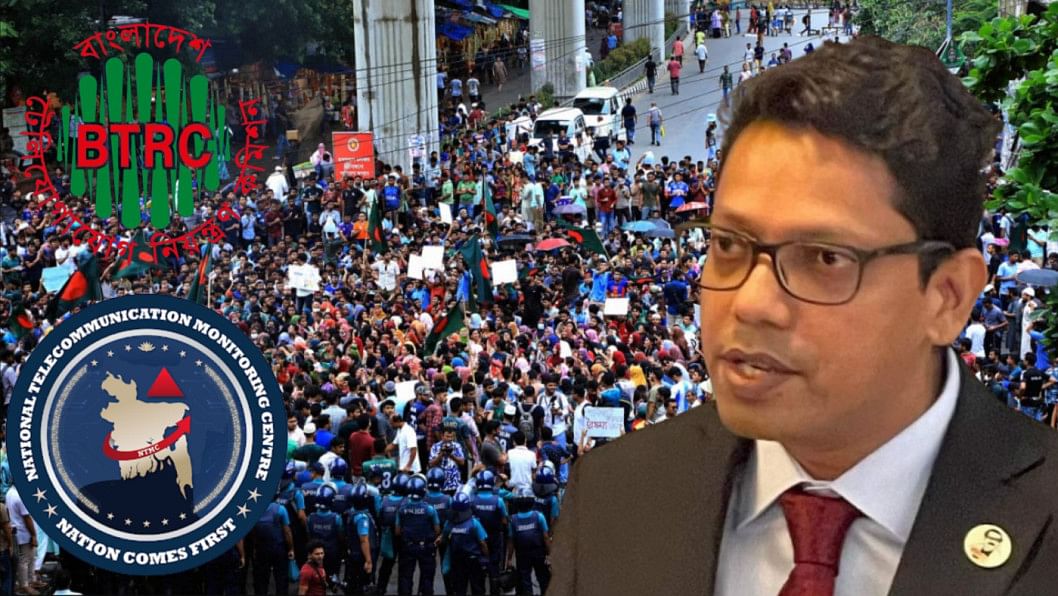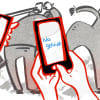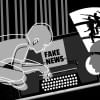What you need to know about internet crackdown in Bangladesh

Internet users in Bangladesh faced numerous problems from July 14 to August 5. The internet was completely banned for more than five days, effectively disconnecting Bangladesh from the entire world. Many social media platforms remained blocked for many days during that period.
Zunaid Ahmed Palak, former state minister for ICT, claimed that the internet was shutdown due to a fire incident on data centres in Dhaka's Mohakhali and the destruction on the telecommunication infrastructure carried out by some miscreants.
However, the protesters said the government deliberately shut down the internet to make it difficult for the protesters to communicate, organise, and coordinate their activities.
Despite these efforts, the strategy ultimately failed. Students and the general public eventually brought down the government, leading to the resignation and flight of Sheikh Hasina.
However, with no internet access and blocked social media platforms, the country faced an immense image crisis and significant business losses.
The shutdown allowed rumours and misinformation to spread more easily.
Businesses that rely on the internet, particularly in the digital economy, were severely affected.
E-commerce, online services and freelance works were disrupted, leading to financial losses.
Journalists struggled to report on the movement due to the absence of internet, resulting in decreased real-time coverage and limited information flow to the public and the international community.
Globally, the shutdown was seen as a violation of freedom of speech and access to information.
International human rights organisations condemned the action, viewing it as an attempt to stifle dissent and control the narrative around the protests.
Palak, however, attempted to control the narrative with lies and deception, staging various efforts to establish that the internet shutdown was not ordered by the government.
The Daily Star published multiple reports on the issue, confirming that the government ordered the shutdown.
In this report, The Daily Star is sharing details on how the situation unfolded, identifying the organisations involved and describing the entire saga of the internet shutdown with the help of related documents, orders and information shared by government and private company officials.
The beginning: July 15
Sheikh Hasina made a comment on July 14: "If the grandchildren of freedom fighters don't get quota benefits, should the grandchildren of Razakars get the benefits?"
This statement made at a press conference at the Gono Bhaban ignited a wildfire among students, who interpreted that the word 'Razakars' was directed at them.
That night, students across the country took to the streets, chanting, "Chaite gelam odhikar, hoye gelam Razakar. Tumi ke ami ke, Razakar, Razakar!" (We went to get our rights, but returned as Razakars. Who are you, who am I? Razakar, Razakar!).
At around 12:30am on July 15, the BTRC via a WhatsApp message instructed mobile operators to shut down 3G and 4G internet services in Shahbag and surrounding areas as well as in the vicinity of Raju Vashkarjo, an anti-terrorism Raju memorial sculpture.
It was mentioned that the instruction was given with the approval of the Posts and Telecommunications Division.

Less than half an hour later, the BTRC sent another WhatsApp message expanding the shutdown area to include Dhaka University (including the Shahbag area), Jahangirnagar University, Chittagong University, Rajshahi University, and Shahjalal University of Science & Technology (SUST).
July 16
As tensions on campuses escalated, the BTRC ordered operators at around midnight on July 16 to shut down mobile internet services at 59 universities across the country.

Following the students' slogans regarding Razakars, the activists of Chattra League, the ruling Awami League's student wing, attacked quota protesters on the Dhaka University campus. Numerous pictures of Chattra League members attacking female students, with images of their bruised and bloodied faces, were widely circulated on social media that evening.
This led to widespread condemnation across the country.
In that evening, the BTRC instructed operators to shut down mobile internet services at Sunamganj Science and Technology University.
On the same day, Palak warned that strict legal action would be taken against social media platforms such as Facebook, YouTube, TikTok, and Instagram if they do not cooperate with the government in countering rumours.
July 17
Protests erupted across the country on July 16 when a video clip went viral showing at least two police officers firing 12-gauge shotguns directly at a protester, Begum Rokeya University student Abu Sayed, from a very close range. Six other deaths were also reported across the country that day.
As the situation worsened, the National Telecommunication Monitoring Centre (NTMC) came to the scene. Despite not being an internet regulator, at around 11:30 pm on July 17, it gave its first instruction to the operators to block Facebook and YouTube starting from 12:01 am on July 18.

July 18
This day marks a dark chapter in Bangladesh's internet rights, as the government completely cut the country off from the internet. It started with mobile internet.
On July 18 at 1:29 am, the NTMC instructed the operators to shut down all 4G services immediately until further notice and keep only 2G services active.

At the same time, the NTMC with its own capability blocked 4G internet services using a content blocking and filtering device, according to the sources close to the development.
In the morning on the sidelines of an event, Palak acknowledged that mobile internet services were blocked nationwide to control the situation and to assist the law enforcement agencies.
Palak mentioned BTRC and NTMC as the technological support providers for the shutdown.
However, on the same day BTRC officials denied having any role in the mobile internet outage.
That day, The Daily Star repeatedly called Major General Ziaul Ahsan, director general of NTMC, to know the reasons of the internet shutdown.
He answered a call for 23 seconds and said, "I will talk to you later". He was later relieved of his post in the army on August 6 and detained a day later.
Dozens of protesting students were killed on July 18 amid a brutal police crackdown.
On the same day, there was also an arson attack at the building of the Department of Disaster Management (DDM) in Mohakhali, where some crucial data centres were located near the building.
At around 8:30 pm, people across the country began reporting that they were not getting any internet service.
At that time, Md Emdadul Hoque, president of the Internet Service Providers Association of Bangladesh, said the country's bandwidth was down by 30 percent due to a fire in the DDM building, which damaged internet transmission lines of the data centres hosted in the adjacent areas.
The next day, the BTRC, in a statement sent through a mobile text message, said the internet connection was disrupted due to the fire set by miscreants in the Mohakhali data centres.

A similar statement was issued by the BTRC's chairman the next day.
Palak, several times, blamed the fire for the complete internet shutdown.
To make it appear real, Palak visited these data centres in Mohakhali, insisting that the government had not shut down the internet, rather it got shut (by itself).
However, The Daily Star earlier reported that its correspondent had not seen any fire in these data centres.
The officials of these data centres also confirmed that the fire had not even reached their building.
The Daily Star was the first to report on July 19 that the government ordered the shutdown.
According to the International Terrestrial Cable officials, the BTRC's engineering and operations division initiated a group call via WhatsApp at 7:37pm among the officials of the International Terrestrial Cable and submarine cable companies to downlink all bandwidth.
With this, Bangladesh got virtually disconnected with the outside world.
July 23
After five days of a complete shutdown, the government ordered the reopening of broadband internet services in selected areas on July 23.
Broadband was restored nationwide a day later.
The Daily Star learned from sources that the international internet gateway (IIG) operators were instructed by the BTRC to block Facebook, the most popular app in the country with about 5.5 crore users, from the gateway devices.
Meta's other platforms, such as Messenger and WhatsApp, and ByteDance's TikTok—the most popular social media and instant messaging apps—were also blocked, leading to slow internet due to the mechanism.
July 28
The government reopened mobile internet in the afternoon on July 28. However, it ordered keeping social media and communication apps blocked such as Facebook, Messenger, WhatsApp, Telegram, Viber, Imo, YouTube, Bip, Signal, Skype, and Botim.

Later that day, the IIG interfaces were opened with mobile operators' network, but internet speed was throttled and unstable.
According to the IIG and mobile operators' officials, BTRC verbally instructed them on that day to enable the cache servers, except for Facebook, Baishan, Akamai, and TikTok.
August 2
As protests continued across the country, the NTMC instructed mobile operators to block Telegram at 2:34 am on August 2. Later that day, it also instructed them to block Facebook and Messenger.
August 4
As protesters took to the streets across the country on August 3, the NTMC instructed the immediate shutdown of 4G internet until further notice on August 4.
August 5
A day after shutting down broadband internet, the IIG operators were instructed to shut down broadband internet services at around 10:30am on August 5.
However, the government ordered the reopening of all internet services, including 2G, 3G, and 4G, immediately at 2pm that day when Sheikh Hasina resigned from the post of prime minister and fled the country.

 For all latest news, follow The Daily Star's Google News channel.
For all latest news, follow The Daily Star's Google News channel. 








Comments